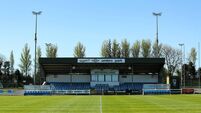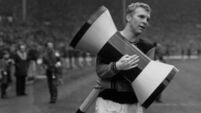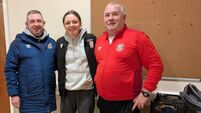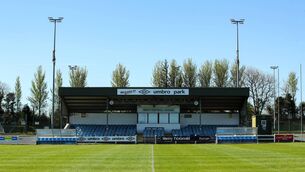High stakes game for Ireland's women
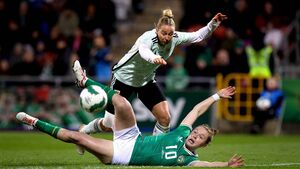
Ireland’s Emily Murphy and Rhiannon Roberts of Wales collide during the International Friendly at Tallaght Stadium last February. So much more is riding on this next meeting of the teams this Friday night. Picture: INPHO/Ryan Byrne
Amongst the many opinion pieces published in our national newspapers since the general election campaign was called almost three weeks ago, the Irish Times has piqued interest by asking three figureheads from the three largest groups in the Dáil to make the case for their respective parties ahead of polling day on Friday.
Gerry Adams advocated for Sinn Fein, Alan Dukes for Fine Gael and Bertie Ahern did it for Fianna Fáil.
Ahern’s piece opened with the following salvo:
Friday brings polling day – for what has been termed as one of the most consequential elections of modern times – but it also brings a big evening for the Republic of Ireland senior women's team, as they play the first leg of their Euro 2025 play-off with Wales in Cardiff.
Much like Ahern's emphasis on the future in political terms, this two-legged affair with our Celtic Cousins from across the Irish Sea is pivotal for the future of this Irish women's team and, perhaps, for football in general in the Republic of Ireland.
The progress made by the team and the association on this front has been magnificent in recent years, culminating in a first-ever World Cup appearance in 2023. Now, however, it's about building on that progress by qualifying for another major tournament. Eaten bread is soon forgotten, and Ireland can help cement the strides they've made by making it to Switzerland next summer.
The time since the World Cup – which is still less than 18 months ago – has been turbulent.
The messy fall-out from Vera Pauw's departure was regrettable and the Nations League campaign, in which Ireland had a 100-percent record with six wins from six, was largely a non-event given the calibre of opposition. Ireland scored 20 goals in their six matches and over the course of the games against Albania, Hungary and Northern Ireland, conceded only two.
The evidence on which to judge this current incarnation of the Ireland team is this year's League A campaign, against top-tier nations in the form of England, France and Sweden. Five defeats and one win – a memorable one against France in Cork – may look like a poor return, but the manner of the performances were largely encouraging as this Irish side takes shape under new manager Eileen Gleeson. The new manager hasn’t changed the set-up hugely – and Katie McCabe’s positioning remains a huge talking point – but by and large, Ireland look like they’re heading in the right direction.
Now, though, they face a task with which Irish teams have traditionally struggled – a match against opposition they are expected to beat.
In a friendly match against the Welsh earlier this year at Tallaght Stadium, the Girls in Green were comprehensively beaten by two goals to nil. Jess Fishlock, the outstanding 37-year-old midfielder, scored one of the Welsh goals.
Perhaps it’s harsh on Wales, who are ranked only five places below Ireland in the world rankings, to say we expect Ireland to win. But that’s the level Ireland have to be at if they want to continue to make strides.
Friday's tie in Cardiff, and the return leg in the Aviva next Tuesday, will be played in an altogether different atmosphere than the friendly from earlier this year, with so much more on the line. Question is: can Ireland do the business?
Much like last year's Nations League run, it is nigh-on impossible to glean much information or insight into Ireland's form from their hammering of Georgia in their play-off semi-final over two legs. Perhaps, if you're really looking for something, you could say there was a hint of complacency in the second leg at Tallaght, with Ireland ‘only’ winning by three goals to nil.
This will be an almighty battle with the Welsh and likely to come down to very tight margins. Don't forget, Ireland have never qualified for a European Championship finals, so there is an element of pressure attached to breaking through that glass ceiling. It's also a chance for Eileen Gleeson to really stamp her mark on the job by securing what would be a significant achievement. For the players, it's a chance to help lay the foundations for future success.
Experienced heads like Niamh Fahey, Louise Quinn and Aine O'Gorman all featured prominently on the run to the World Cup, but now the likes of Caitlin Hayes and Abbie Larkin are among the protagonists, while Galway's Julie Ann Russell has been a revelation in recent months.
McCabe and Denise O'Sullivan are still the heartbeat of the team but Ireland will need to be patient and efficient against a Welsh side primed to make life very difficult.
A positive result for Ireland over the course of the two legs will help solidify this team’s status as standard setters and help make qualifying for major tournaments the norm as opposed to the exception. With a steady stream of younger players beginning to make a mark at senior level – think of the likes of Larkin, Tyler Toland, Izzy Atkinson and Leanne Kiernan – the future looks decidedly bright.
Qualification for another major tournament would help show that last year’s World Cup appearance wasn’t a once off, but the start of something major.
In sport, like politics, the future is what it’s all about.
